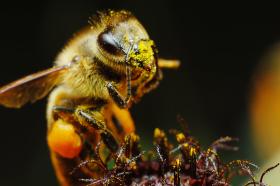What is the value of bees?
Can You Put a Price On Bees? Scientists Have, and itís Staggering

What are bees worth to our economy? A group of researchers have attempted to do the math, and the result shows exactly why we need to protect our pollinating bees but also why we canít rely on economic worth alone to make our arguments for saving threatened species.
It may sound slightly abhorrent to put a price on a living creatureĖand, to an extent, it is. But calculating the monetary worth of wildlife and, in particular, their place in the overall economy has become a useful way for researchers to communicate to governments and even that they need to take a closer look at preventing species die-out. When it comes to bees however, researchers have found an interesting fact that they say shows the worth and the shortcomings of this approach.
Publishing in the journal Nature Communications, researchers detail how they set about this task by following data from nearly 74,000 bees across 780 bee species that was collected as part of over 90 research projects that are investigating the way bees pollinate and interact with crop fields.
What they found was that the bulk of pollination was actually done by just two percent of bee species in the study, and that they contributed up to around 80 percent of the overall pollinating activity.
In total, the researchers calculated that for agricultural security as well as the task of pollinating crops, wild bees may be worth as much as $3,250 per hectare per year. As the Guardian points out, thatís more than managed honeybee colonies which still for an impressive but lower $2,913 a hectare.
As the researchers point out, the figure is so that we canít help but highlight it, but it throws up an important topic: talking purely in terms of economic worth, there appears little reason to preserve the other bee species, and currently many governments focus only on the primary pollinators as part of their environment management strategy.
However, researchers say that is a mistake. Professor Simon Potts of the University of Reading, which was involved in this study, is quoted as saying that it would be an error to think that we can just invest in certain bee populations and that protecting other species doesnít matter: ďIt is critical to protect a wide range of bees and other insects now so that [...] we can call on the pollinating species which are best suited to the task. We canít just rely on our current starting line-up of pollinators. We need a large and diverse group of species on the substitutesí bench, ready to join the game as soon as they are needed, if we are to ensure food production remains stable.Ē
The researchers in the above study say that their work demonstrates that when we talk about conservation, we need to look at not just the short term benefits that species bring but the long term need to protect diversity. As such, we need to target our conservation efforts not just at the species that are most common or those we deem most useful right now, but also those that might appear less productive but are no less important for long term agricultural security.
This research comes at a time when the UKís Conservative government, which as part of the previous coalition government proved hostile to many environmental policies, is considering whether to give its backing to farmers who want to start using neonicotinoids again, a substance that until relatively recently was part of many insecticides. It has been identified as one of the reasons behind colony collapse disorder and other problems that wild bees have faced in recent years that have seen bee numbers fall, sometimes dramatically, across the globe, and so was banned by the Europe.
The UK governmentís stance has previously been that the European wide ban is not backed by overly convincing science despite a consensus emerging that insecticides are at least playing a part in bee die-off, and now environmental campaigners are concerned that the Conservative government may snub what science actually shows and instead cave to farmers and the big agricultural businesses that have previously offered to bring business to the UK.
As the above research shows though, this would be incredibly short-sighted and could pose a real risk to agricultural security.
Macro image of bee via Shutterstock.